
It is a combination of 70% Marine Lipid and 30% lecithin. Combining Marine Lipid with lecithin significantly enhances the pharmacological activities of Marine Lipids.
While the mechanism for this enhancement is not yet understood it is likely that at least one of the mechanisms is improved cell to cell signal transmission as a result of well maintained cell membrane integrity.
Marine Lipid is combined with olive oil in a ratio of Marine Lipid complex to nine parts olive oil. In this form the natural pharmacological activity of the specific Marine Lipid as an anti-inflammatory in rheumatic arthritis and angiogenesis inhibitory agent is significantly enhanced. Anti-inflammatory and angiogenesis inhibitory activities are important for the mediation and control of many diseases, particularly angiogenesis related disorders such as cancer, rheumatic arthritis, psoriasis and diabetic retinopathy.
It has been shown to inhibit the activity of enzymes responsible for the biosynthesis of pro-inflammatory prostaglandins and leukotrienes in addition to mediating cytokine activity.
It has also been shown to be an effective inhibitor of growth factor activity, in particular the growth factors known to stimulate angiogenesis such as VEGF-1 and VEGF-2.
Lecithin is a phospholipid (an oil or fat) that also contains a phosphate group). In chemical terms lecithin is phosphatidyl choline. However, commercial lecithin contains different amounts of phosphatidyl choline depending on the source from which it has been derived. Common sources are soybeans, sunflower seeds, rapeseeds and egg yolks.Commercial lecithin products usually contain about 20% phosphatidyl choline although lecithin derived from egg yolk can contain 70% phosphatidyl choline.
The lecithin combined with Marine Lipid is from egg yolks. Phospholipid is a major component of our cell membranes and is responsible for maintaining the integrity of the membrane as well as providing a source of choline (a precursor in the synthesis of the neurotransmitter acetylcholine).
Cell membrane integrity and, in particular, fluidity is crucial to our normal biological functions and health. Many diseases, one of which is psoriasis, are exacerbated by a loss of integrity of our cell membranes.
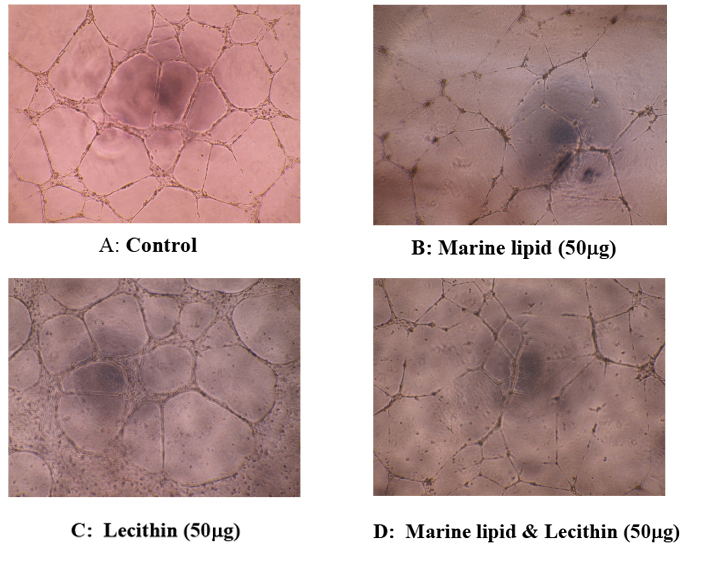
The results presented above indicated that a combination of Marine Lipid with lecithin exerted a synergetic anti-angiogenesis effect. This anti-angiogenesis bioactivity suggests that this combination has a potential clinical application in angiogenesis related disorders.
Psoriasis is a disease that mainly manifests in the skin but, in some instances (psoriatic arthritis), also in the joints. The disease is immune–mediated and manifests in painful, itching skin lesions and inflammation. Psoriasis is mediated by some of the same proinflammatory cytokines and growth factors that are involved in chronic inflammatory diseases such as rheumatoid arthritis. Cytokine and growth factor activity in a process called angiogenesis (the birth of new blood vessels) leads to excessive cell proliferation.
In particular Vascular Endothelial Growth Factors (VEGF-1 and VEGF-2), which play a major role in angiogenesis and cell proliferation have a significant adverse influence in psoriasis. Research into agents that can inhibit these pathogenic functions, without creating other adverse effects, has resulted in a natural product comprised of a combination of a Marine Lipid and lecithin.
This combination has produced excellent results in a study at a dermatological clinic in the United States. Chronic cases of plaque and pustular psoriasis that had failed to respond to all previous treatments have shown a significant reduction in the affected areas within two to eight weeks of commencing to use the combination.
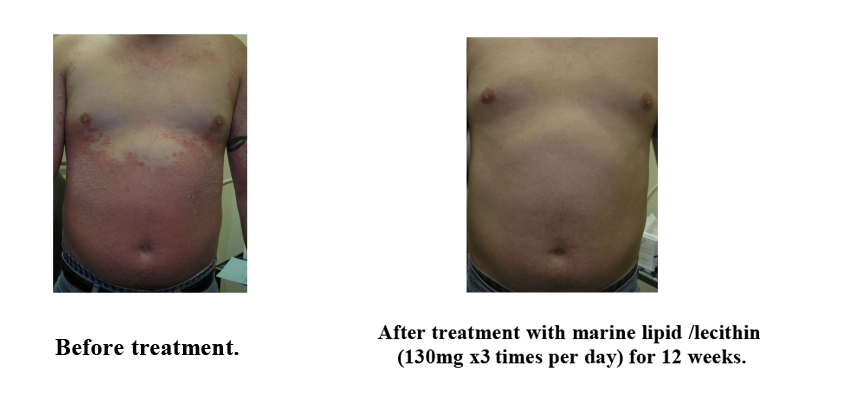
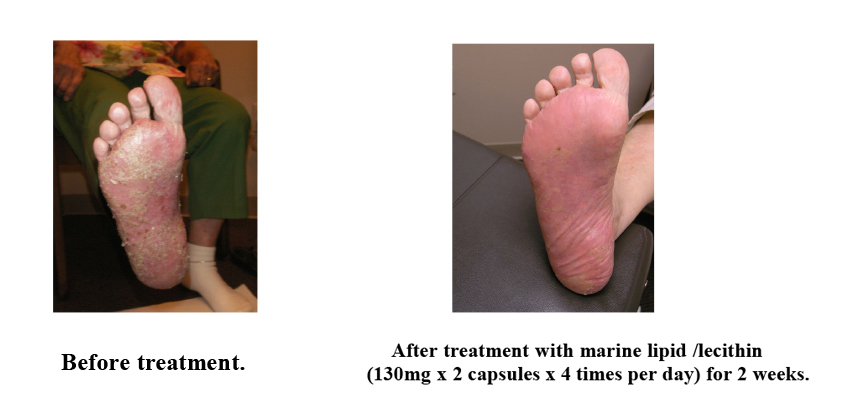
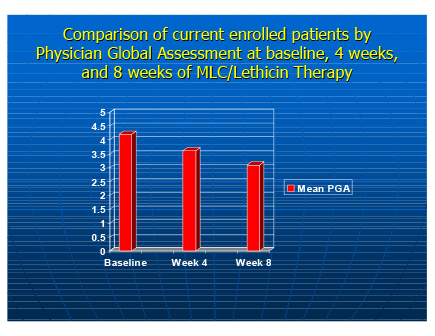
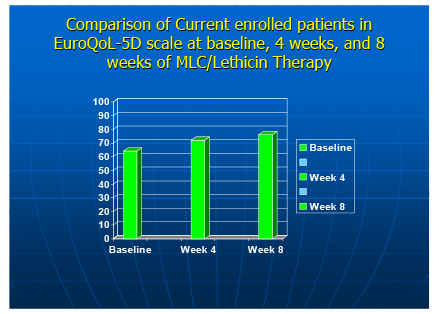
From the above cases, taken together with a range of other cases of moderate to severe psoriasis treated with Marine Lipid and lecithin, it can be seen that this product provides a safe and effective treatment for the control of the symptoms of this debilitating disease.
Integration of this natural product into the recognized treatment regimes for psoriatic diseases will complement, or reduce the requirement for, the use of steroids and other anti-inflammatory compounds which can induce unpleasant side effects.